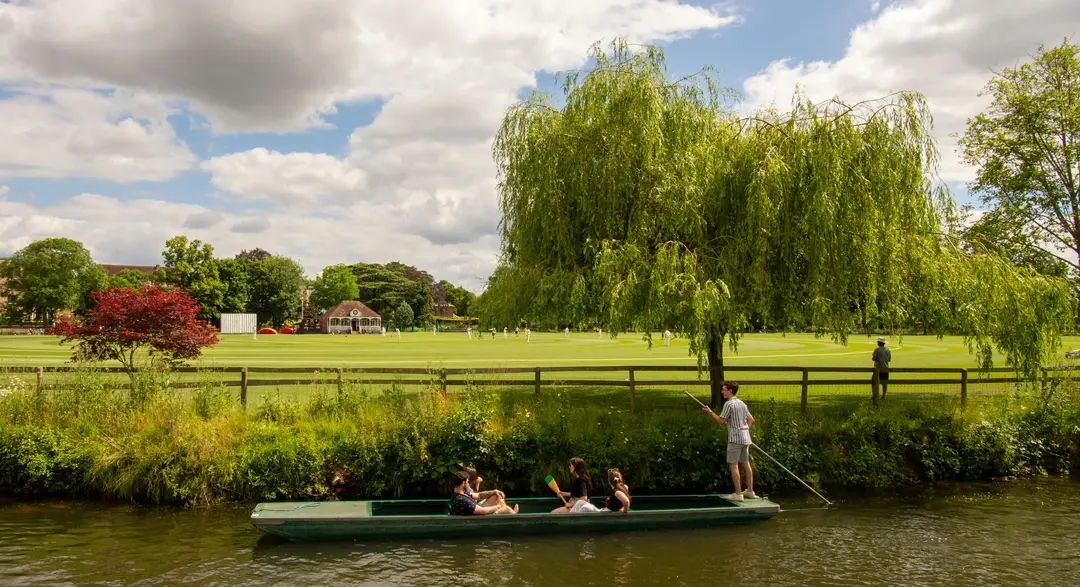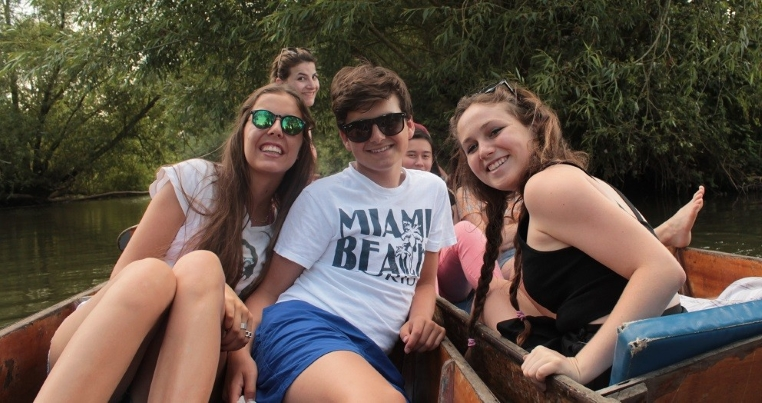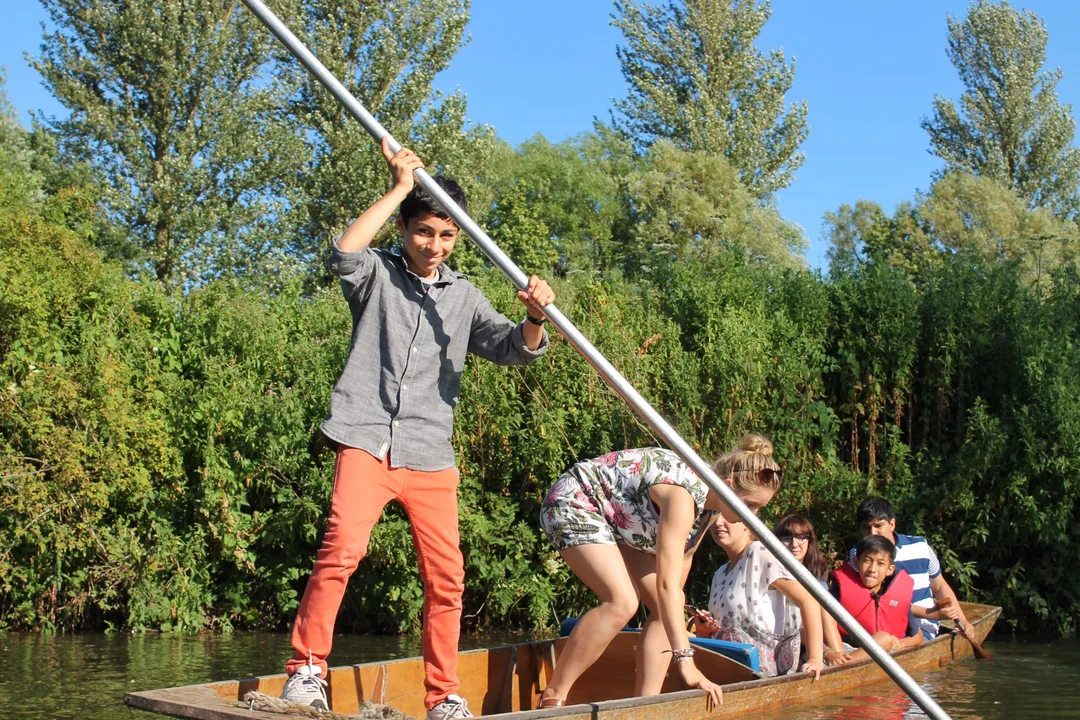While an Oxford summer school offers no shortage of academic opportunities, it’s also a time for students to experience the city through a variety of engaging extracurricular experiences.
Perhaps most quintessential of these is punting, or the pushing of a flat-bottomed boat along the river using a long pole.
This relaxing activity, intended for long summer afternoons, is an ideal way to embrace Oxford’s traditions while having fun with newfound friends. This is why an exciting punting afternoon is an integral element of our residential programmes!
What Is Punting?
If you’ve yet to visit Oxford or Cambridge, there’s a chance that you’re unfamiliar with punting. However, this historic English pastime is one that Oxford Scholastica students often look forward to the most upon receiving their summer school timetables. So, what exactly is punting?
Punts are the name given to flat-bottomed wooden boats which are moved along the water. Typically, one person stands at one end of the punt and pushes off the shallow river bank with a five metre pole.
Punting began during medieval times, originally as a form of river transport in waters that were too shallow for traditional boat passage. Long before the advent of advanced motorways and the rise of air transport, the tradespeople of England, including in the cities of Oxford and Cambridge, relied on punts as a primary form of transportation.
However, since the 19th century, punting has gradually morphed into a beloved leisure activity. Passengers are able to peacefully drift along local rivers, becoming a symbol of pastoral life in England.
Types of punting
The most popular form of punting is river punting. This serene experience involves one person navigating the punt down the river while others relax and enjoy the scenery from a seated position in the punt. This type of punting allows students to enjoy the natural scenery, take a welcome break from academic obligations, and embrace a storied English tradition.
Another type of punting is pole punting, which focuses more on the navigation techniques used to move the punt along the river. Punters engaging in this variation will follow a designated course along the water, aiming for accuracy and speed.
A Whistle-Stop Tour of a Punt
There’s a variety of essential punting gear necessary for a safe and enjoyable experience. This includes the:
- Pole. The quintessential punting tool – a long pole with a flat metal end, this is used for propulsion and steering. The pole is usually about five metres in length, and is central to pole punting.
- Punting platforms. Some punts have raised platforms at the end, offering better visibility and control for the lead punter.
- Pole rest or fork. A holder or fork near the edge of the punt to rest the pole when not in use, preventing the pole from slipping into the water.
- Push poles. These are shorter poles used in shallower waters. They’re ideal for navigating through reeds or areas with limited depth.
- Anchor. Some punts are equipped with a small anchor to temporarily secure the punt in place. This gives the navigator a chance to take a break and enjoy the scenery.
Be sure to familiarise yourself with the different parts of a punt’s set up before braving the waters!
How Do You Punt?
Alongside the gear used for river punting, there’s also a specific set of techniques to learn:
- Positioning yourself at the rear (stern) end of the punt, sometimes atop a punting platform
- Placing one foot at the back and one towards the centre for balance
- Grasping the punt pole near the top with both hands
- Inserting the pole into the water vertically and pushing against the riverbed
- When starting an outing, leaning the pole slightly forward and gently pushing straight behind the punt
- Using the pole like a rudder to steer
If the pole is sinking into a particularly soft or muddy part of the river, don’t push too hard. Give the pole a twist and yank it out of the mud. If you need to let a stuck pole go to avoid falling in yourself, do so! You can always recover it with a paddle later!
Popular Punting Destinations
Punting is a quintessential highlight of our Oxford summer school. Oxford (like Cambridge and Canterbury) is a beautiful city worth exploring, and punting offers students the perfect chance to kick back and take in the sights from a unique perspective.

Oxford’s punting scene
Oxford has a vibrant punting scene, given its central location along the River Thames and the River Cherwell – a tributary of the Thames itself! The famous Cherwell Boathouse is a favourite hub for punters, and the starting point for our punting afternoon at Oxford Scholastica.
The city’s historic landmarks that line the riverbank make for a punting experience that’s as informative as it is picturesque. Some of our favourite spots along the Cherwell include the iconic Magdalen Bridge and the beautiful Oxford Botanic Garden, which is the oldest botanic garden in the UK!
Other destinations
Beyond Oxford, there are a number of renowned places worldwide where punting is a popular pastime. However, there are some differences in punting techniques across locations.
In Cambridge, for example, it’s a common misconception that you should punt from the back of the boat – as opposed to the front in Oxford. In actuality, you should always punt from the back of the boat!
With that said, Cambridge passengers do sit in the sloped end of the punt and whoever is navigating the boat stands on the flat platform. In Oxford, however, the slope at the end of the boat provides an ideal vantage point for directing the punt.
In Canterbury, punting is also a popular activity for students and locals. It differs from punting in Oxford in a few ways. In particular, punting in Canterbury takes place along the River Stour, and like Cambridge, lead punters tend to stand upon the flat platform on the boat.
There are lots of other locations where similar modes of transport are used. Perhaps most famous are the gondolas of Venice, which are often mistaken for punts. However, this misconception has been known to upset punting enthusiasts – so the distinction is certainly an important one!
5 Reasons to Try Punting
Punting is an activity rich with benefits for students of all backgrounds and interests. Here are some of our favourite reasons to try your hand at punting!
1. Relax and unwind
Amidst the busy days of an Oxford summer school, it’s important to find time for experiences outside of the classroom. Punting provides a perfect space for relaxation and fun with newfound friends.
It’s also a fantastic stress buster! The calm and peaceful atmosphere on the water is a perfect escape from the hustle and bustle of academic life.
2. Experience Oxford from a new perspective
Punting also allows students to experience the city from a new perspective. Witnessing the picturesque and historic views along the storied waterways of Oxford, punters gain a unique perspective of Oxford’s beauty – whether that’s the beauty of the landscape, of the historical landmarks, or the beauty of friendships found and forged during the summer programme.

3. Connect with friends and family
Punting is inherently a communal activity, so be sure to try it with friends and family. Whether these are new friends from summer school, or family visiting for a lazy afternoon, punting provides an idyllic space to share laughs, stories and experiences on the water with your loved ones.
It’s also an excellent way to strengthen bonds and relationships as it relies on a sense of community and trust – especially between those sitting in the boat and the person navigating the punt along the river!
4. Immerse yourself in tradition
Punting is a rich Oxford tradition, so next time you’re visiting, rent a punt, explore the storied sites of the city, and cast yourself against the same backdrops where the great scientists, scholars and thinkers of history made their home.
5. Create lasting memories
Perhaps most importantly, punting creates lasting memories that will endure well beyond one summer afternoon.
Students form bonds and long-lasting memories while navigating the waters during their punting outings. During our summer school programmes, punting typically takes place on the second full day in Oxford, so you can jump right in to the fun!
Top Tips for Punting in Oxford
Before you brave the waters, here are several tips to keep in mind for a smooth punting afternoon!
Dos
- Respect and be aware of other river users
- Wear suitable, comfortable attire that won’t restrict your movements
- Consider wearing a life jacket if you’re not a confident swimmer
- Yield to oncoming punts in narrow passages
- Be mindful of the wildlife along the waterbanks
Don’ts
- Don’t litter, and make sure to dispose of your rubbish responsibly
- Respect private property along the riverbanks, and avoid disembarking without permission
- Avoid excessive noise to maintain the peaceful atmosphere
- Avoid overcrowding the punt, as it can compromise safety
Ultimately, the classroom isn’t the only space where an Oxford summer school takes place. Extracurricular activities allow students to gain a greater sense of community, explore the storied traditions and landmarks of Oxford, and learn a new skill.
Punting serves as a fantastic example of this, even for students who arrive with little to no familiarity with this quintessential Oxford pastime. In following the above tips and tricks, students can make the most of the punting afternoon offered by Oxford Scholastica – and might even discover a relaxing new hobby in the process!
So, why not try punting for yourself ? An Oxford Scholastica summer course is an excellent way to experience this pastime and everything else Oxford has to offer!

By Adam Kluge





